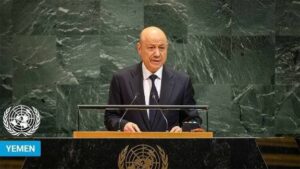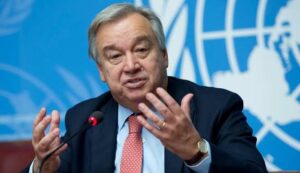The 80th session of the United Nations General Assembly (UNGA) has already been marked by sharp exchanges, fiery speeches, and heightened diplomatic tension. Among the most striking interventions came from a Yemeni representative, who accused the United Nations of systemic bias and double standards in its treatment of global conflicts.
In a speech that has since circulated widely on video, the Yemeni delegate pointed to the UN’s strong symbolic support for Palestine while highlighting its comparative silence on atrocities in Sudan, Syria, Yemen, and other conflict-torn states. His critique not only resonated in Arab diplomatic circles but also stirred debate on the credibility and impartiality of the UN itself.

The Yemeni Representative’s Speech
Key Accusations
Palestine vs. Other Crises: The speaker acknowledged that Palestine’s recognition was a significant milestone but asked why the UN had failed to extend the same seriousness to Sudan, Syria, or Yemen, where conflicts have claimed hundreds of thousands of lives.
Selective References: He charged that Israel had been mentioned “188 times” in UN discussions, while Iran was only mentioned once — a disparity he framed as proof of selective prioritization.
Arab Suffering Ignored: The UN, he argued, seemed comfortable when “Arabs kill themselves” in internal conflicts, but mobilized quickly when Palestine’s case against Israel was at stake.


Challenge to the UN: He called on the institution to broaden its recognition policies and crisis interventions, warning that credibility was eroding if double standards remained the norm.
Rhetorical Impact
The Yemeni delegate’s remarks struck a chord because they combined moral outrage with statistical claims, painting the UN not as a neutral arbiter but as an institution swayed by geopolitical convenience. His speech framed Palestine not as a unique case but as a test of fairness — one the UN had failed by ignoring other crises of equal or greater scale.
Historical Context: Palestine Recognition and Selectivity
The question of Palestine has dominated UN proceedings for decades:
1988: UNGA Resolution 43/177 acknowledged the Palestinian declaration of independence.

2012: UNGA Resolution 67/19 upgraded Palestine to “non-member observer state” status.
Current Recognition: As of 2025, 157 of 193 UN member states (≈81%) recognize Palestine as a state.
This symbolic success stands in contrast to conflicts such as:
Sudan: The ongoing war between the Sudanese Armed Forces and Rapid Support Forces has killed over 150,000 people, displaced millions, and triggered famine conditions.
Syria: Since 2011, the Syrian civil war has killed an estimated 500,000+ people and displaced nearly half the country’s population.
Yemen: The Yemeni conflict, often described as the world’s worst humanitarian crisis, has led to over 370,000 deaths (direct and indirect) and left 80% of the population dependent on aid.

For critics, the disparity in UN responses suggests that recognition and urgency are applied unevenly — particularly when the victims are Arab or Muslim populations.
Reactions from Arab States and Analysts
Qatar
Qatar’s Prime Minister has repeatedly condemned “double standards” in international conflict response. While not commenting directly on the Yemeni speech, he has insisted that selective outrage undermines global governance: “Accountability cannot be a choice; it must be consistent.”
Saudi Arabia
Saudi diplomats have likewise accused the UN of inconsistency. Arab News editorialized in late 2024 that double standards “weaken the very foundations of international law,” noting the imbalance between responses to Israel-Palestine and conflicts within the Arab region.
Analysts
Geopolitical Interests: Scholars highlight that UN action is often filtered through the veto powers of the Security Council — the U.S., Russia, China, France, and the U.K. Each exercises influence to shield allies or downplay crises outside their core interests.
Narrative Politics: Media and diplomatic focus often amplify certain conflicts (e.g., Israel–Palestine) while underreporting others (e.g., Sudan). This shapes perceptions of UN bias, even when structural causes lie in member-state politics.
Moral Hazard: Analysts argue that repeated selectivity erodes the UN’s authority, emboldens perpetrators in neglected conflicts, and feeds cynicism among developing nations.
The UN’s Position: A Right of Reply
To balance criticism, it is essential to note the UN’s own declarations and institutional context.
Secretary-General’s Stance
Secretary-General António Guterres has acknowledged widespread perceptions of impunity and selectivity. At a 2024 debate, he declared: “The rise of impunity in international relations is politically indefensible and morally untenable.” This reflects awareness at the highest level that credibility is at stake.

Structural Realities
Security Council Veto: The UNGA can pass resolutions, but binding action often requires Security Council approval. Veto powers frequently block interventions in conflicts where their allies are involved (e.g., Russia on Syria, U.S. on Israel).
Resource Constraints: The UN manages multiple global crises simultaneously. While resolutions may focus on some conflicts, humanitarian arms like UNHCR and WFP are heavily engaged in Yemen, Syria, and Sudan.
Countering Disinformation: The UN Secretariat has emphasized combating partial narratives and misperceptions. Officials argue that citing speech counts (188 vs. 1) oversimplifies how the UN engages with conflicts — resolutions, funding allocations, and field operations often tell a broader story.
Institutional Defense
UN defenders argue that while recognition of Palestine reflects sustained member-state lobbying and consensus, the absence of similar recognition elsewhere reflects political fragmentation among stakeholders, not institutional bias per se.
Comparative Cases of Selectivity
Kosovo (2008): Recognized by over 100 states but not admitted to the UN due to Russian and Chinese opposition.
Western Sahara: Claimed by Morocco but recognized by the African Union. UN engagement has been minimal, drawing accusations of neglect.
South Sudan (2011): Rapidly admitted to the UN after secession, showing that political will can overcome obstacles when consensus exists.


These cases highlight that recognition and UN focus are often contingent on geopolitical alignments rather than objective humanitarian need.
Analysis: Why This Speech Matters
The Yemeni representative’s address was not just about Palestine. It tapped into deeper grievances felt across the Global South:
Perception of Second-Class Crises: Arab and African conflicts appear to receive less attention, reinforcing suspicion that international concern is conditional.
Challenge to UN Credibility: If the UN is seen as selective, it undermines its universal mission and weakens global buy-in for multilateralism.
Catalyst for Reform Demands: Speeches like this fuel calls for Security Council reform, greater equity in agenda setting, and less dominance by powerful blocs.
Implications Going Forward
Arab Diplomacy: The speech may galvanize Arab and Muslim states to coordinate pressure on the UN to expand recognition and accountability beyond Palestine.
UN Legitimacy: Persistent claims of bias will continue to dog the UN unless structural reforms are advanced — an uphill battle given veto politics.
Public Opinion: Viral clips of fiery speeches resonate with publics in the Middle East and Africa, deepening skepticism about the UN’s impartiality.
Palestine as Benchmark: While Palestine’s recognition remains a victory, it also sets a precedent that critics can invoke to demand similar treatment for other crises.
Conclusion
The Yemeni delegate’s intervention at UNGA 80 was both a condemnation and a challenge: if the UN truly stands for justice, then consistency must replace selectivity. By contrasting Palestine’s recognition with the neglect of Sudan, Syria, and Yemen, he exposed a fault line between principle and practice.
The reactions from Qatar, Saudi Arabia, and analysts show that this perception of bias is widely shared, while the UN’s own right of reply highlights structural limitations and political realities.
Ultimately, the speech underscores a paradox: the UN’s credibility rests on universality, yet its actions are constrained by power politics. Unless these contradictions are addressed, the institution risks alienating the very nations it was built to serve.
Princess G. Adebajo-Fraser MFR. International Governance Consultant & Public Analyst.




